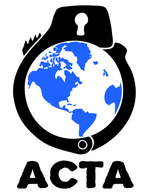Paris, April 10th 2012 – The European Parliament has decided not to refer ACTA to the EU Court of Justice, and will normally hold its final vote this summer, as originally planned. This coming week marks a new opportunity for EU citizens to engage with their elected representatives in Brussels, calling on them to move swiftly toward a thorough political assessment of ACTA.
The institutional face-off on ACTA procedure
The EU Commission is doing everything it can to save ACTA from rejection by engaging in an institutional face-off with the EU Parliament. Let’s sum up:
- Two weeks ago, the Parliament made clear that it would not refer ACTA to the Court of Justice and would vote on ACTA without delay.
- A few days later, the EU Commissioner for Trade Karel De Gucht made public the text of its own referral to the Court, and urged the Parliament to “respect” the Court by waiting for its opinion anyway, which would take at least 18 months.
Of course, the Commission is not interested in knowing whether ACTA is compatible with EU law, or else it would have asked for the Court’s opinion during the negotiations1Its referral is a mere delaying tactic aimed at escaping the current political context. This explains why pro-ACTA lobbies support the referral. “We fully support the Commission’s decision to expeditiously refer the text to the Court of Justice of the European Union(…)”, wrote Ger Hatton, Director General of the International Confederation of Music Publishers (ICMP). See the comment section of this Euractiv article: http://www.euractiv.com/infosociety/commission-sides-business-acta-news-511991.
“The Parliament must absolutely resist the pressure from the Commission and protect its prerogatives. The Members of the Parliament should not be distracted from the important work in committees on the political assessment of ACTA.”, said Philippe Aigrain, co-founder of the citizen advocacy group La Quadrature du Net.
EU Parliament must proceed with political assessment of ACTA
 This week, besides two important hearings (April 11th and April 12th) in the EU Parliament, the different political groups will meet and discuss the working programmes of the committees working on ACTA:
This week, besides two important hearings (April 11th and April 12th) in the EU Parliament, the different political groups will meet and discuss the working programmes of the committees working on ACTA:
- In the “International trade” (INTA) committee – the leading committee working on ACTA – rapporteur David Martin (UK, S&D) has announced that it will present a draft report on April 26th, which will either recommend approval or rejection of ACTA. Last week, the rapporteur hinted that he would propose that the Parliament withhold consent to the agreement2According to David Martin: “there is a real danger that such an intentionally vague text on enforcement could have very dangerous consequences if applied zealously.”. See http://www.publicserviceeurope.com/article/1728/fear-outweighs-hope-in-acta-debate. But his position will have to be confirmed, and backed by his fellow INTA colleagues.
- In the “Civil Liberties” (LIBE) committee, which will draft a report assessing the impact of ACTA on fundamental freedoms, rapporteur Dimitrios Droutsas (Greece, S&D) will have to conduct a thorough political analysis of ACTA’s consequences for freedoms online. The LIBE report should interpret ACTA’s very vague wording in the light of recent policy developments in the field of online copyright enforcement, considering in particular how criminal sanctions, intermediary liability and “cooperation” between Internet actors and the entertainment industry will result in privatised censorship3See La Quadrature’s analysis of ACTA: http://www.laquadrature.net/en/acta-updated-analysis-of-the-final-version.
- In the “Industry” (ITRE) committee, rapporteur Amelia Andersdötter (Sweden, Greens/EFA) has proposed an encouraging draft opinion report stressing that ACTA “appears to be contrary to the ambition (…) to make Europe the scene for cutting edge internet innovation, as well (…) promote net neutrality and access to the online digital market for SME”. Innovators and entrepreneurs should engage with the ITRE committees to ensure that all its members understand why ACTA runs counter growth and innovation, in the digital economy and beyond.
- The rapporteur for the “Development” (DEVE) committee, Jan Zahradil (Czech Republic, ECR), presented a very bad draft report, back in January. The latter absolutely needs to be amended to review the crucial questions related to ACTA’s consequences on developing countries, and in particular the human rights concerns regarding access to medicines and free speech online.
- Finally, members of the “Legal Affairs” (JURI) committee will need to resist the rapporteur Marielle Gallo (France, EPP), famous for her extreme positions on online copyright enforcement. Their draft opinion report, which still needs to be presented, must focus on ACTA’s provisions going beyond current EU law (i.e criminal sanctions, border measures), but also on the obvious democratic deficit of this so-called “trade agreement” which bypasses legitimate international organisations and national parliaments to impose a brutal repression.
Learn more about the ACTA procedure in the EU Parliament.
References

